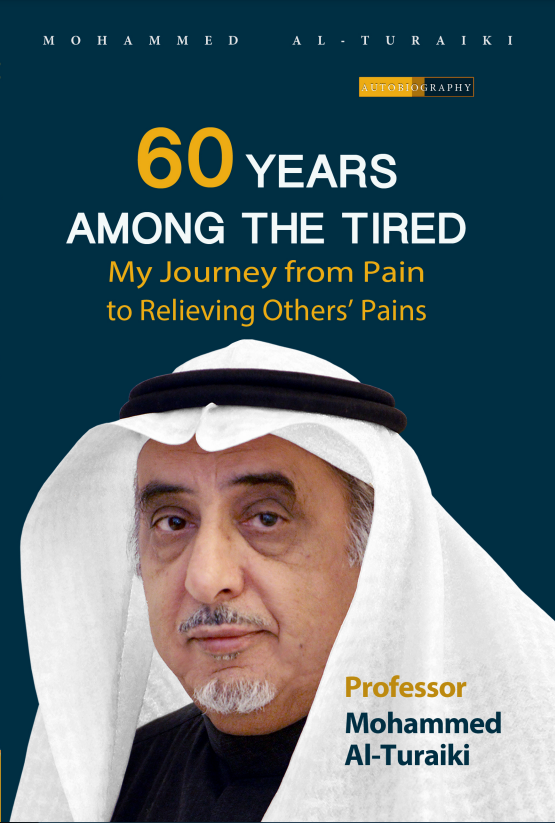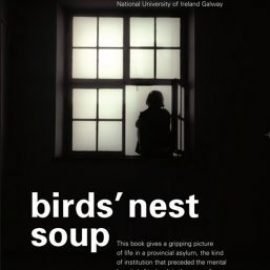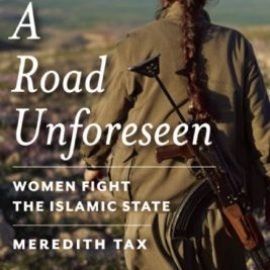Description
This post is also available in:
 العربية (Arabic)
العربية (Arabic)
I could probably say that this book contains two stories: the story of the father, Hamoud ‘Al Rweibekh’, with all its temporal and spatial transformations, achieving life-changing things out of almost nothing; and the story of the son, Mohammed, in his struggle with illness and his final victory for the sake of life, knowledge and success. Two times are contrasted in both 12 Sixty Years among the Tired stories, but the solid will is the same, imposing one’s success and prevailing through science, technology and service of mankind, irrespective of race, colour or social class. The father lit the city streets with electricity, and the son lit people’s hearts and minds with his discoveries and philanthropy. But both father and son share a similar motif: they both show that good, like evil, does not come out of nowhere, but grows across generations, particularly through the morals inculcated first by the uncle into the father, and then the father into the son, with the son following the same track. It is the journey of man towards man.
Through over 234 pages, Prof. Mohammed Al Turaiki takes us on a journey into life’s wonders and special moments. Right from the beginning, he puts us on the harsh, relentless terrains and awesome glory of the facts of life as such: “I don’t deny that I feel pained for things that I have missed, and grievances done to me, but when I reflect on my journey, I see things that keep me
wonder. At a time when all I wanted was to help others, there were some whose only goal was to sabotage what Allah helped me to achieve.” This message and effort remind me of prominent classical autobiographies. Narrators often step out of their individual self (though always omnipresent) towards the collective social self, which gets influenced by the quakes of historical and geographical transformations, hence lessening, or even annihilating, all traces of selfaggrandisement that is typical of autobiography genre, given its relation to the human self.
Through Sixty Years among the Tired, which is written in a lucid and profound manner, we explore a world that is part of the Arab Peninsula, namely Al Zulfi. It was never an ordinary place: “Al Zulfi, that green spot, fortified by Al Nefud Desert and Tuwaiq Mountains, as though it were an ancient secret of Najd Desert, or a sanctuary for passengers coming in search for its pure water and delicious date fruits”. We see this world through the journey of the father, Hamoud ‘Al 14 Sixty Years among the Tired Rweibekh’, who was orphaned very early due to the death of his father, Sulaiman Al Turaiki, when he was but a foetus, and began his life in the household of his maternal uncle, Abdulaziz, who along with his mother, Lolowa, gave him the much needed care and love. They taught him to be responsible at a very early age, and showed to him that the only option in life was through hard and diligent work, accompanied by a certainty to achieve victory over the barren, harsh desert life. The uncle, as did the father, managed to overcome this difficult life and subjugate it to his own will, power and mighty patience.
The energetic young Hamoud showed signs of brilliance, goodness, and light. When the uncle realised that his nephew was able to carry the responsibility, knowing that he no longer could carry the burden alone due to old age, he gave it to the young man wholeheartedly, having taught him the secrets of the trade and the way to people’s hearts. The young Hamoud became the travelling businessman, reaching the farthest 15 My Journey from Pain to Treating Others’ Pain points he could to bring people’s needs, but at the same time gaining wealth that enabled him to live a hard earned and well deserved betteroff life. Indeed, it was through hard work that the young man became stronger and stronger, and it was through honesty that he managed to create strong relationships with others in general and clientele in particular. To ensure that the young man remained focused and strongly attached to the family, the uncle had him marry a niece, and later his own daughter.
The caravans led by Al Rweibekh give us a glance at the life and circumstances that form the setting of a part of the story, reflecting the human evolution toward the fruits of the Industrial Revolution, which had changed the world but which had not hitherto reached the Arab Peninsula, particularly Al Zulfi. It so happened that Al Rweibekh would be the one to bring technology to the region and people with and through him would discover a world that heretofore they had no clue about. The camels 16 Sixty Years among the Tired that patiently carried goods through deserts were gradually replaced by the Great Machine, and life became much easier for mankind. The traveller was no more in need to carry water and fodder for the animals: some petrol would suffice to get man and his caravans through the ins and outs of desert.
The father, Hamoud, did not stop at that. His merchandise diversified as a result of his boldness, brilliance and unwavering dedication to prove to the uncle that his trust, efforts and sacrifices were put in the right place. In a very short period of time, Hamoud’s business transformed the entire place: “The news of his travels and returns became the talk of the town. Al Zulfi residents would wait impatiently for his returns, carrying their sustenance and required commodities, from the cities of Iraq, Kuwait, etc. There he would sell his loads of hides, wool balls, and Najdi dates, and come back with rice, sugar, fabrics, women needs, and even medicines. So, his returns were as if life itself came to Al Zulfi people”
Hamoud’s acumen led him to the importance of electricity in people’s life, and he made sure he was the one to light his region, amid the astonishment of most of Al Zulfi residents, who could not easily understand how a heretofore dark oasis turn into brilliantly lit streets. This discovery changed the life style of Al Zulfis, and gave them opportunities to a better, easier and more loving life. In a very short period of time, the father became a state authorised electricity provider, and his company was commissioned to expand from north to south, earning its place among major KSA cities, Riyadh and Jeddah: “… the electricity company he decided to found was the first in Al Zulfi and the third in KSA, preceded only by Riyadh and Jeddah. The company was established on a piece of land granted by the state (following state’s immediate approval on a request submitted by my father), and Al Zulfi became the third lit region in KSA”. His shrewdness also enabled him to get franchise of several state markets. His adventures never ceased to amaze his people. In 1937, he helped Al Zulfis discover something truly amazing to 18 Sixty Years among the Tired them then – i.e. the ‘truck’ – which could carry as much as 10 camels’ load and move very fast. But any successful man is always exposed to the attacks of unsuccessful ones, particularly those who oppose transformation and positive change. When a state minister was on an inspection visit to Al Zulfi, some local notables did not invite Hamoud to come over. Nonetheless, he went and met the minister anyway, sat in a remote spot inside the gathering place, but negotiated strongly in favour of Al Zulfi and its residents.
Hamoud’s son, Mohammed, the protagonist of this autobiography, grew up in this great and challenging atmosphere. The father had an immense desire to ensure proper education for his son. In addition to education in KSA, Mohammed’s education journey took additional 10 years in UK, including a UK-accredited SSC, Bachelor’s, Master’s and PhD. Like his father, Mohammed dreamt of replicating international state-of-theart medical technology in his homeland to serve the needy.
His relationship with Britain started 19 My Journey from Pain to Treating Others’ Pain prior to that, though, as a result of his sickness and fragile health conditions. He knew he had to be one of the top 10 SSC graduates in KSA to avail of the state funded scholarships, which he did. He then travelled to Britain, where he went to hospital and underwent a complicated surgery in his lungs, in which a part of it was removed. After that, he was cured, and life became more beautiful. He had a dream to become a doctor and serve his community and country. Unfortunately, the points he had collected were not enough to join a medical college, and his second best option was engineering. The change of medium of instruction from Arabic to English was difficult, particularly at the initial stages of his scholarship.
He thought of studying medicine in Pakistan or Lebanon. But something happened to him and invoked the memory of his father’s strong will. When people told him he would not realise his dream of lighting Al Zulfi and neighbouring areas, the father went against their expectations and later declared his victory in the challenge by throwing his iqal (headband) to the ground: 20 Sixty Years among the Tired “It [the possibility to study of medicine outside Britain] was a source of great hope to realise my dream, but it conflicted with my father’s iqal. The iqal was indeed so stubborn and so determined that it refused to quit under any pretexts without achieving an ultimate victory”. Mohammed ended up studying engineering at Lancaster University, north of England. He got a bachelor’s degree in mechanical engineering. But something was always pushing him toward medicine until one day he found an interdisciplinary field combining both medicine and engineering in Salford University, in Manchester.
The field is Prosthetic and Orthopaedic Engineering, which has to do with synthetic body parts and integrates both medicine and engineering. In 1984, Mohammed got his PhD and had a patent in his name. His big dream was to bring these advanced experimental technologies to his country, to the people who badly needed them, but bureaucracy in the Arab world, as elsewhere, stood as a stumbling block in the appreciation of this effort and the creative energy this enthusiastic young man had. 21 My Journey from Pain to Treating Others’ Pain Wherever he went, he was cornered and denied even the possibility of finding a job commensurate with his specialty. He could not find a job in both the colleges of engineering and medicine at King Saud University when he applied, before he joined the National Centre for Science and Technology and managed in no time to get promotion to the position of Deputy Manager of Medical Sciences Department. Later, in his search for a place where he could conduct research in his field, he joined the College of Applied Sciences at King Saud University: “Thus, I was the first faculty member of this specialty in the university, and the first head of Department of Biomedical Technology at King Saud University”. Later on, he was able to manage a huge centre that contributed immensely to solving many problems for many disabled persons.
Throughout his way, he never paid attention to how much money he would spend in order to bring happiness to others. But the winds of envy and jealousy oftentimes blow against the route of the vessels of goodness 22 Sixty Years among the Tired and philanthropy. The successes achieved by the man coming from abroad, and his strict discipline, irked many of success leeches and non-achievers and they did whatever they could to obstruct him from delivering his humane message. He had to leave the place after a clash with the dean, who stated explicitly that his powers did not entitle him to purchase a pencil, let alone costly equipment. But how could one direct an important centre without the necessary equipment? Finally, he came up with an idea to establish a prosthetics centre for the disabled, known as the Joint Research Centre for Research in Prosthetics, Orthotics and Rehabilitation (JCRPO). He got approval from the Ministry of Health, and he had to find a source of funding, part of which he got from the supreme authorities in the country. However, the “mentally disabled” disablers were always there lurking and working in the dark, and ultimately succeeded in shutting down the centre and its activities and denying around 9,000 physically challenged individuals from medical services and follow-up. 23 My Journey from Pain to Treating Others’ Pain Reading this beautiful and painful autobiography, we can imagine the amount of agony felt by the father and the son in a world that can be anything but easy. On the other side, we can imagine the amount of happiness felt by Al Zulfis as they joined civilisation by engaging with electricity, machines and easier life. We can also imagine the joy of the long despondent individuals who – after a long sad phase of life – discovered that normal life was possible and that they could move or walk and benefit from the endless possibilities and advances made in medicine day after day.
This autobiography sheds light on an important lesson of life: the necessity of determination, strong will, and overcoming obstructions to one’s way. Positive energy becomes crystal-clear at the darkest moments, because life is lived only once: either live a life with depth and humaneness, or a life devoid of sense and purpose. The protagonist of this story chose to side with fellow human beings, to stand with the tired who needed him 24 Sixty Years among the Tired most, even if he had to work through a vortex of fight to help good overcome evil. We are not born with an innate love of goodness, but we grow up with goodness and see it daily, even in limited ways, and we know goodness is there in the world. The father, Hamoud, paved a part of the way, and the son, Mohammed, came to continue what the father had started: times are different, but the essence is the same. Autobiographies are often too difficult to classify perhaps because they emanate from the inner self in its confusions and supreme desires, intersecting to reveal to us a complete life with its transformations and convulsions. Some autobiographies are typical, just like the one in hand, providing lessons in logicality, determination and persistence to do good, even in the most difficult circumstances. The power of Nature did not prevent the father from overcoming difficulties, becoming an authority in Al Zulfi as well as other neighbouring places he lit (literally and figuratively speaking), and 25 My Journey from Pain to Treating Others’ Pain helping people discover things and technologies unknown to them so far. The same thing was done by the protagonist of this autobiography: he insisted on the light of science, culture, knowledge, enlightenment, and provision of aid to those in need. There are also autobiographies which are not typical, and may not pursue specific lessons, except for the human will which is highlighted in the textual structure itself, building its entire project on the immense cruelty of man, war and oppression to the degree of turning people into stray creatures that have lost the minimum limit of being human, like the autobiography of the Moroccan writer, Mohamed Choukri, For Bread Alone.
As such, the structure of this autobiography pushes its sometimes-violent details into a central theme, i.e. victory for life and inimitable will. The illiteracy rampant in rural areas did not prevent Mohamed (Choukri) from transforming stark illiteracy at the age of 20 to a journey of learning, working as a tourist guide for foreigners and Tangiers’ lovers, and turning into a writer whose fame went beyond local borders to 26 Sixty Years among the Tired international levels. The autobiography For Bread Alone was translated into more than 30 world languages. Ultimately, an autobiography is man in its essence, epitomised by and exhibited in words.
Waciny Laredj
This post is also available in:
 العربية (Arabic)
العربية (Arabic)
 English
English 




